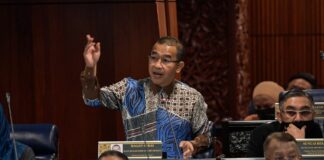PETALING JAYA,Feb 18: They have been hailed as heroes due to their efforts in battling the pandemic and they are being sent to hospitals where most of the Covid-19 patients are. But contract medical officers, who make up much of Malaysia’s first line of defence, don’t feel like heroes.
Most actually feel like stepchildren.
While health minister Dr Adham Baba said in November that those who have completed their housemanship will be upgraded from the U41 to U43 pay grade upon becoming a medical officer, those who spoke to FMT said they have yet to receive any update on the status of the change, or any increase in salaries.
A contract medical officer from Kuala Lumpur said “things have become very difficult for junior doctors in Malaysia”, adding that many of her colleagues are concerned about an uncertain future and a lack of recognition for their work in combating Covid-19.
“Everyone talks about how valuable frontliners are, but we are the ones getting posted to Covid-19 centres for months.
“I’m making less now than what I did as a houseman because I lost my RM600 flexi-allowance once I became an MO. Some people might say that if you want to be a doctor, you shouldn’t care so much about money, but we just want to feel appreciated.”
She was one of the first to be absorbed by the contract system implemented in 2016, conceived as a way to manage the glut of medical graduates competing for the handful of permanent roles.
Five years on, and with her contract set to end in December, she has yet to hear about what comes next.
“One of the officers I spoke to said they had not received any updates about what will happen after this contract, and another said I should start looking at other job opportunities, just in case.”
Another doctor, speaking to FMT from Negeri Sembilan, said the system of extensions was inherently flawed, as it disqualifies many eager junior doctors from becoming specialists, a particular issue given their dwindling numbers.
“Our specialists are declining in the government sector. More people are moving to private, and the masters intake is just a small portion of the number of doctors coming into the system every year.”
He said the duration of the contracts offered does not allow these doctors to meet the criteria for masters courses, made worse by their ineligibility for the Hadiah Latihan Persekutuan study grant which would help fund further studies.
“Even if you want to take a parallel pathway to specialise, the disciplines are limited and the costs, often more expensive than a masters programme, are high.
Dr Muhammad Yassin, a medical officer posted to Port Dickson who finished his housemanship last year, said that in addition to the lower pay and prospects, contract doctors are also denied many of the essential benefits that permanent staff receive.
He said that while he understood that not every contract MO can be made permanent, as there are only so many slots available, he hopes that they can receive perks comparable to their permanent colleagues, as the scope of their work is largely the same.
“We don’t get things like hazard leave, radiation leave (for those in radiology departments to minimise excess exposure), breastfeeding leave, or tuberculosis leave, so we risk our health in order to stay working.
“During the pandemic, most of the frontliners are contract officers. Almost all of my contract colleagues have been posted to Covid-19 centres, including myself. If only the government could recognise our efforts and sacrifice by at least offering us perks and benefits similar to what’s given to permanent officers.”



















